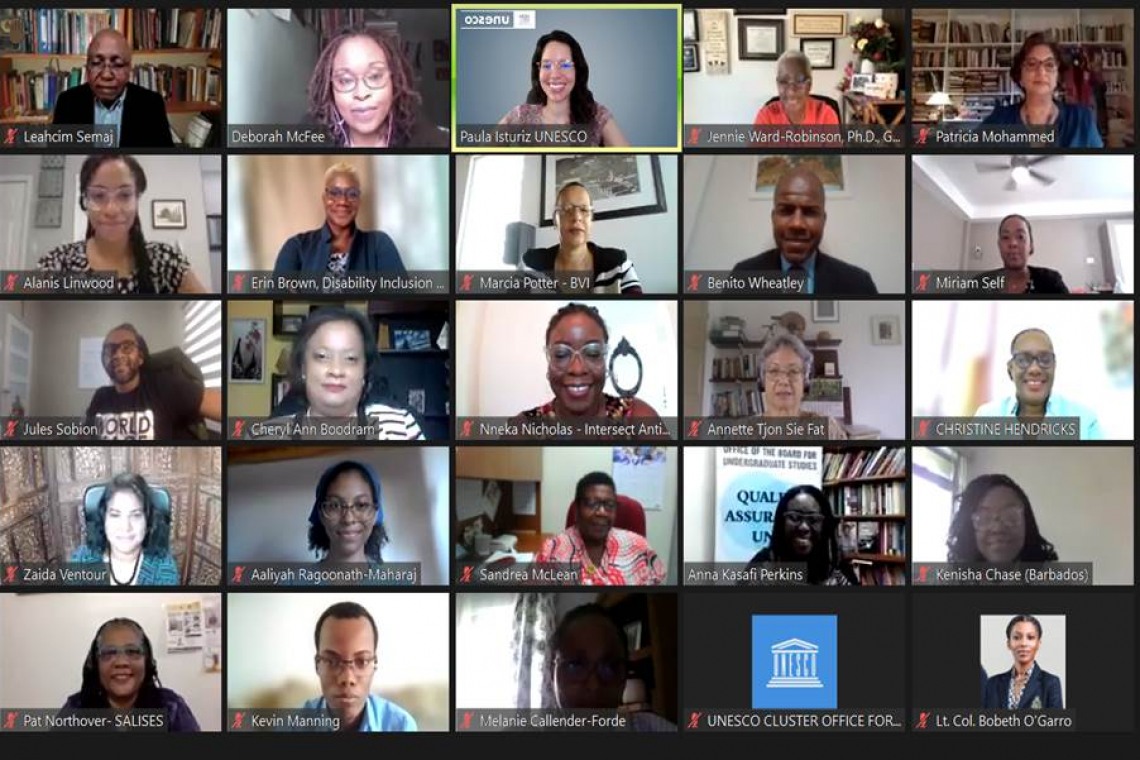Group photo of participants in the UNESCO/UWI-organised virtual dialogue on life in the region.
ROAD TOWN, BVI--The British Virgin Islands (BVI) has called for a digital and balanced recovery in the Caribbean from the COVID-19 pandemic, at a virtual dialogue on work and life in the region, organised by UNESCO and The University of the West Indies (The UWI) on September 9.
During the dialogue’s High-Level Panel, Special Envoy of the Premier Benito Wheatley made remarks on the importance of balancing the social, economic and digital aspects of recovery in the Caribbean.
According to Wheatley, “In the context of COVID-19, there can be no separation of economic recovery from social recovery. The two are intimately tied together. The economic dislocations and risks to public health brought about by the pandemic have increased the number of socially vulnerable people in the Caribbean, who require ongoing support. There is, however, an opportunity to make the recovery more inclusive and equitable based on our knowledge of the vulnerable groups who we know will be left behind if policy interventions are not made.”
He also called for regional efforts to ensure the public at large is healthier and economically empowered when the Caribbean eventually achieves a fully recovery from the pandemic.
“What we require is a recovery in which the population emerges from the pandemic healthier and able to more meaningfully participate in the society and economy. Achieving this would involve a sustained public health campaign focused on healthier lifestyles and economic empowerment initiatives,” Wheatley said.
Regarding the role of digitisation in recovery, the special envoy highlighted the acceleration of digitisation in the region in response to the pandemic, which can be an advantage in the near- and medium-term.
“The pandemic has pushed the Caribbean to become more digitised in its operation and more innovative in the delivery of services. In fact, digitisation in both the public and private sectors has taken place at a pace that previously seemed unattainable. Although connectivity remains imbalanced in the Caribbean, we have made great strides since 2020. We have significantly improved our ability to work and learn via online platforms, as well as boosted e-government and the ability to deliver public services electronically and virtually. This will hopefully improve the overall productivity and efficiency of the Caribbean in many areas of life,” Wheatley said.
Dr. Marcia Potter, Permanent Secretary in the BVI Ministry for Education, Culture, Youth Affairs, Agriculture and Fisheries, also participated in the virtual meeting and highlighted the need for the region to establish long-term unemployment benefit schemes that provide financial security for employees in the event of mass layoffs from a future pandemic or another external economic shock, such as a natural disaster.
The BVI’s input at the dialogue on Equitable Recovery in Caribbean Small Island Developing States (SIDS) will contribute to UNESCO/UWI’s policy recommendations on recovery in the region and the provision of resources for implementation.







